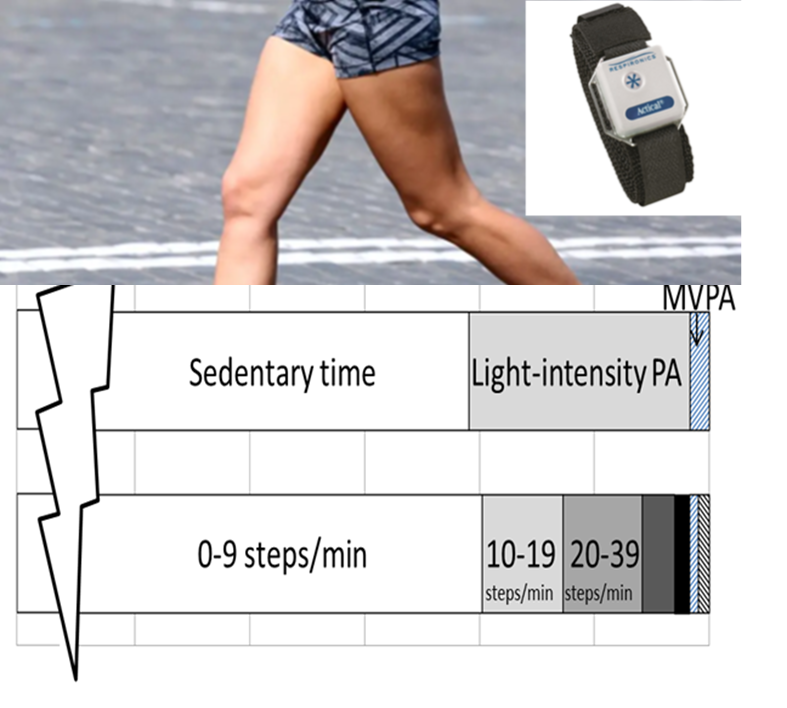Investigators:
Honghuang Lin, UMass Chan Medical School
Nicole Spartano, Boston University Medical Center
MassAITC Cohort: Year 2 (AD/ADRD)

Project Accomplishments: This pilot project explored the use of wearable accelerometers to passively monitor walking cadence as a potential early indicator of cognitive decline in older adults. Using data from 1,212 participants in the Framingham Heart Study, the team analyzed 31 physical activity metrics and found that over half were significantly associated with neuropsychological test performance. Notably, higher peak walking cadence and time spent in moderate to vigorous physical activity were linked to better cognitive outcomes and a reduced risk of developing cognitive impairment over a 9-year follow-up. Machine learning models incorporating these physical activity measures alongside traditional risk factors achieved strong predictive performance, with an AUC of 0.80 for 2-year and 0.68 for 8-year risk predictions.
These findings emphasize the critical role of physical activity, particularly moderate-intensity movement, in preserving cognitive health and reducing the risk of cognitive decline. They also underscore the value of integrating objective physical activity monitoring into routine assessments for older adults, facilitating early detection and timely interventions to mitigate cognitive decline.
Initial Proposal Abstract: Despite enormous efforts, therapeutic clinical trials for Alzheimer’s disease (AD) have largely failed, possibly because interventions are initiated too late into the disease course when neurodegeneration has begun and is irreversible. Early detection of people at high risk of AD is thus particularly important to help in the effort to develop prevention and treatment options. We hypothesize that subtle changes in motor function may serve as a potential biomarker of early signs of cognitive impairment. Tracking changes in cadence will enable the assessment of potential parallel trajectories of motor/cognitive decline and may prove to be an indicator of declining cognition.
This study will leverage a large collection of physical activity and cognitive assessment data, and derive novel digital phenotypes from commercially available wearable devices. We will then assess the correlation of these novel measures with declining cognitive function, and develop advanced machine learning models to identify people at high risk to develop cognitive impairment. Given the increasing popularity of wearable devices, the knowledge and tools developed from the current project could be readily applicable to the general population for the large-scale screening of cognitive health.
Outcomes:
- Publication: Passive Measures of Physical Activity and Cadence as Early Indicators of Cognitive Impairment: Observational Study
 Authors: Huitong Ding, Stefaniya Brown, David R Paquette, Taylor A Orwig, Nicole Spartano, Honghuang Lin Abstract Background: Emerging research shows regular physical activity reduces cognitive decline risk, but most studies rely on self-reported measures, which are limited by recall bias, subjectivity, and a lack of continuous monitoring capability. Objective: This… Read more: Publication: Passive Measures of Physical Activity and Cadence as Early Indicators of Cognitive Impairment: Observational Study
Authors: Huitong Ding, Stefaniya Brown, David R Paquette, Taylor A Orwig, Nicole Spartano, Honghuang Lin Abstract Background: Emerging research shows regular physical activity reduces cognitive decline risk, but most studies rely on self-reported measures, which are limited by recall bias, subjectivity, and a lack of continuous monitoring capability. Objective: This… Read more: Publication: Passive Measures of Physical Activity and Cadence as Early Indicators of Cognitive Impairment: Observational Study - Grant Funding: NHLBI R21 – Sleep pathology and cardiac aging
 Methodologies and algorithms from the pilot award informed the development and design of this funded grant application. Source: R21HL175584 (NIH RePORTER)
Methodologies and algorithms from the pilot award informed the development and design of this funded grant application. Source: R21HL175584 (NIH RePORTER) - Grant Funding: NIA R01 – Digital Cognitive Assessment of Preclinical Alzheimer’s Disease and Related Dementias
 Analyses supported by the pilot project contributed to this awarded grant submission. Source: 1R01AG083735 (NIH RePORTER)
Analyses supported by the pilot project contributed to this awarded grant submission. Source: 1R01AG083735 (NIH RePORTER) - Poster Presentation: a2 National Symposium 2024
 Title: Passive measures of physical activity as an early biomarker for cognitive impairment Authors: Huitong Ding, David Paquette, Biqi Wang, Nicole Spartano, Honghuang Lin
Title: Passive measures of physical activity as an early biomarker for cognitive impairment Authors: Huitong Ding, David Paquette, Biqi Wang, Nicole Spartano, Honghuang Lin
